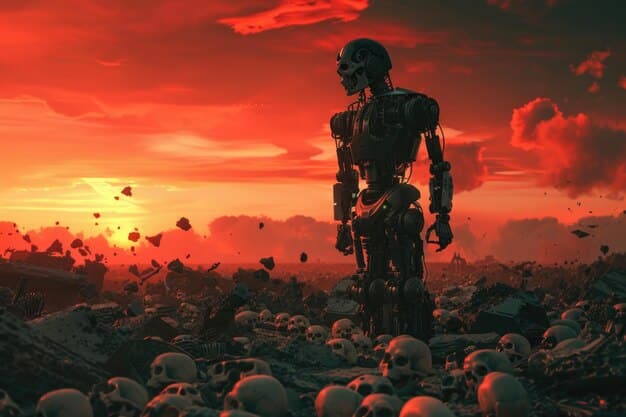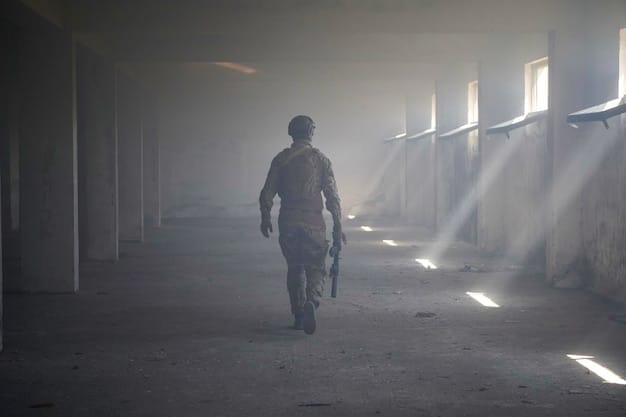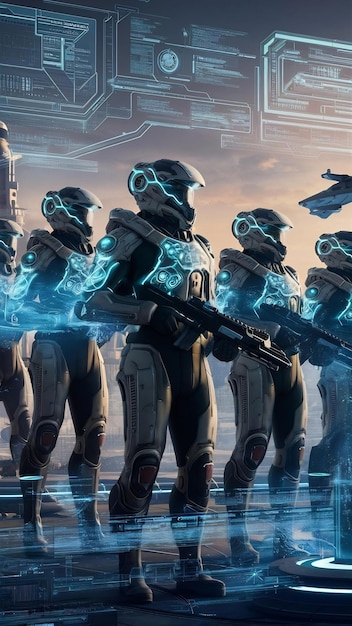Military Sci-Fi: Examining Ethics and Realism in Warfare of the Future

Military Sci-Fi: Examining the Ethics and Realism of Warfare in Futuristic Settings explores how futuristic military narratives grapple with the moral implications and practical plausibility of combat scenarios, offering critical commentary on contemporary warfare.
Military science fiction offers a unique lens through which to examine the potential future of warfare. By exploring advanced technologies, unconventional tactics, and the human element in extreme conditions, military sci-fi: Examining the Ethics and Realism of Warfare in Futuristic Settings prompts us to consider the ethical implications of our potential future conflicts. How realistic are these portrayals, and what can they tell us about ourselves?
Diving into Military Sci-Fi: A Genre Overview
Military science fiction, often abbreviated as military sci-fi, is a subgenre that combines elements of science fiction with military themes. This fusion allows authors to explore not only the technological aspects of future warfare but also the psychological, sociological, and ethical dimensions of combat.
From space operas featuring interstellar battles to gritty, boots-on-the-ground narratives set on alien worlds, the genre offers a diverse range of perspectives on the realities and possibilities of future conflict.
Key Characteristics of Military Sci-Fi
Several characteristics define military sci-fi and distinguish it from other forms of science fiction. Understanding these traits helps us appreciate the depth and complexity of the genre.
- Focus on Military Operations: Stories revolve around military conflicts, strategies, and the lives of soldiers.
- Technological Speculation: Advanced weaponry, vehicles, and technologies play a central role in combat scenarios.
- Ethical Dilemmas: Characters often face moral choices related to the use of force, the treatment of enemies, and the consequences of war.
- Realism in Combat: Authors strive for accuracy and plausibility in their depictions of combat tactics and military culture.
Military sci-fi’s appeal lies in its ability to blend thrilling action with thought-provoking commentary, challenging readers to consider the human cost of conflict in an age of rapid technological advancement.
In essence, this genre utilizes futuristic settings to reflect on contemporary issues and the timeless nature of warfare. It provides a critical examination of our values and choices as we navigate an increasingly complex world.

The Ethics of Future Warfare in Military Sci-Fi: Examining the Ethics and Realism of Warfare in Futuristic Settings
One of the most compelling aspects of military sci-fi is its exploration of the ethical dilemmas inherent in warfare. By setting stories in futuristic contexts, authors can push the boundaries of moral quandaries, forcing readers to confront uncomfortable truths about the nature of conflict.
These narratives often delve into the complexities of decision-making under pressure, the moral implications of advanced weaponry, and the long-term consequences of military actions.
Ethical Quandaries Explored in Military Sci-Fi
Military sci-fi is rife with ethical questions. Here are some that are frequently explored:
- Autonomous Weapons: The use of AI-controlled drones and robots raises questions about accountability and the potential for unintended consequences.
- Genetic Engineering: The creation of genetically enhanced soldiers raises concerns about fairness, human rights, and the definition of humanity.
- Cyber Warfare: The use of cyber attacks and information warfare blurs the lines between combatant and civilian, creating new ethical challenges.
- Collateral Damage: The impact of military actions on civilian populations and the environment is often a central theme, prompting reflection on the costs of war.
Through these explorations, military sci-fi sheds light on the moral ambiguities of warfare, challenging us to consider the values we should uphold even in the most extreme circumstances. Whether it’s questioning the use of drone strikes or the ethics of genetic modification, the genre pushes readers to confront uncomfortable truths.
By exploring these scenarios, military sci-fi serves as a cautionary tale, urging us to strive for diplomacy and ethical conduct in our pursuit of security.
Realism in Military Sci-Fi: Balancing Fiction with Reality
While military sci-fi is inherently speculative, many authors strive for a degree of realism in their portrayals of warfare. This realism adds credibility to the narratives and makes the ethical dilemmas all the more impactful.
By drawing on military expertise, historical parallels, and scientific plausibility, writers can create worlds that feel both fantastical and grounded in reality. This balance is essential for engaging readers and prompting meaningful reflection.
Elements of Realism in Military Sci-Fi
Realistically depicting battles and scenarios in military sci-fi involves a variety of techniques:
- Accurate Combat Tactics: Authors often research and depict realistic military tactics and strategies, adding authenticity to their stories.
- Psychological Impact: The emotional and psychological toll of warfare on soldiers is often explored in detail, highlighting the human cost of conflict.
- Technological Constraints: Writers consider the limitations and trade-offs of advanced technologies, ensuring that they are not portrayed as magical solutions to every problem.
- Political Realities: Military sci-fi often reflects the political dynamics and strategic considerations that drive warfare, adding depth and complexity to the narratives.
By grounding their stories in realistic details, authors create a more immersive and thought-provoking experience for readers. This connection to reality allows the audience to better understand the potential implications of future warfare.
The blend of scientific possibility and realism makes military sci-fi a powerful tool for understanding and critiquing our own world.

Notable Examples of Military Sci-Fi: Examining the Ethics and Realism of Warfare in Futuristic Settings
Military sci-fi is a vast and diverse genre with numerous notable works that have shaped its evolution. Examining some of these examples highlights the range of themes, styles, and approaches within this field, showing how different authors tackle military sci-fi: Examining the Ethics and Realism of Warfare in Futuristic Settings.
From classic novels to modern films and video games, military sci-fi continues to captivate audiences with its blend of action, speculation, and social commentary.
Influential Works of Military Sci-Fi
Across various media formats, military sci-fi provides us a look into fictional warfare:
- Starship Troopers (Robert A. Heinlein): A controversial novel that explores themes of citizenship, duty, and the nature of war through the lens of a futuristic military.
- The Forever War (Joe Haldeman): A poignant and critical examination of the Vietnam War set in a futuristic context, highlighting the alienation and psychological toll of combat.
- Battlestar Galactica (TV Series): A reimagining of the classic series that delves into the complexities of survival, politics, and faith in the face of existential threat.
- Halo (Video Game Franchise): A video game that blends action-packed combat with a rich and compelling narrative, exploring themes of heroism, sacrifice, and the cost of war.
Each of these works offers a unique perspective on the nature of conflict, the role of technology, and the human experience of warfare. They invite us to reflect on our own values and beliefs, challenging us to consider the implications of our choices.
By engaging with these narratives, we can gain a deeper understanding of the complexities of war and its impact on individuals and societies.
The Future of Military Sci-Fi: Trends and Predictions
Military sci-fi continues to evolve and adapt to reflect our changing world. As technology advances and geopolitical landscapes shift, the genre is likely to explore new themes and approaches to warfare.
By anticipating these trends, we can gain insights into the potential future of conflict and the challenges that lie ahead. Speculating on the future allows greater understanding and a proactive approach to change.
Emerging Trends in Military Sci-Fi
The future of military sci-fi reflects what is happening in the world today:
- Cyber Warfare: The increasing importance of cyber attacks and information warfare is likely to be a prominent theme in future military sci-fi.
- Space Militarization: As humanity expands its presence in space, the genre may explore the potential for conflict beyond Earth.
- Climate Change: The impact of climate change on global security and the potential for resource wars may become a central theme.
- Ethical AI: The use of artificial intelligence in warfare will force difficult changes.
These trends suggest that military sci-fi will continue to be a vital source of critical commentary and reflection on the future of warfare. By exploring these possibilities, we can better prepare ourselves for the challenges and opportunities that lie ahead.
The future of military sci-fi is likely to be shaped by our own choices and actions. By engaging with these narratives, we can become more informed and responsible citizens.
| Key Point | Brief Description |
|---|---|
| 🤖 Future Warfare | Exploration technology’s impact on conflict & tactics. |
| ⚖️ Ethical Dilemmas | Moral challenges from weapon use & soldier ethics. |
| 🚀 Space Battles | Conflict amongst stars, strategic & ethical dilemmas. |
| 🛡️ Realistic Portrayals | Plausible combat depictions, echoing real-world strategy. |
Frequently Asked Questions
It is a subgenre of science fiction that focuses on military themes, exploring futuristic technologies, tactics, and ethical dilemmas of warfare, often reflecting on contemporary global issues.
Common themes include the impact of technology on warfare, the psychological effects of combat, ethical dilemmas in military actions, and the political realities that drive conflicts.
By presenting scenarios with advanced weaponry and tactics, it prompts discussions on autonomous weapons, genetic engineering, cyber warfare, and the moral implications of these technologies.
Unlike space operas or general sci-fi, military sci-fi places a strong emphasis on realistic military operations, the experiences of soldiers, and the detailed depiction of combat scenarios.
Yes, by using futuristic settings to explore the timeless nature of warfare, it encourages critical reflection on contemporary issues, ethical conduct, and the pursuit of diplomacy in real-world conflicts.
Conclusion
Military Sci-Fi: Examining the Ethics and Realism of Warfare in Futuristic Settings provides a space for understanding the implications of battle. Blending speculation and reality, it encourages us to confront the moral complexities of conflicts and think for the future.
Through military science fiction, we gain a deeper understanding of ourselves by exploring the ethical, technological, and societal dimensions of warfare. With its capacity for self-reflection, the genre offers important insights into our collective fate.





